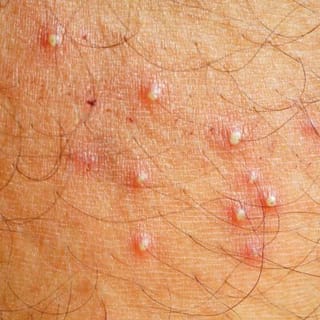 Folliculitis is the medical term for inflammation of a hair follicle. It typically presents as pink bumps or pustules (pus filled bumps) centered around a hair follicle. The condition can appear anywhere on the body where there are hairs, including on the face, chest, back, buttocks, and/or legs. The condition can be caused by infections (commonly bacteria or yeast), irritation, occlusion/blockage, or medications. Common treatment options include topical and/or oral antibiotics or antifungals.
Folliculitis is the medical term for inflammation of a hair follicle. It typically presents as pink bumps or pustules (pus filled bumps) centered around a hair follicle. The condition can appear anywhere on the body where there are hairs, including on the face, chest, back, buttocks, and/or legs. The condition can be caused by infections (commonly bacteria or yeast), irritation, occlusion/blockage, or medications. Common treatment options include topical and/or oral antibiotics or antifungals.
Disclaimer:
The information on this website is provided for educational and information purposes only and is not medical advice. Always consult with a licensed medical provider and follow their recommendations regardless of what you read on this website. If you think you are having a medical emergency, dial 911 or go to the nearest emergency room. Links to other third-party websites are provided for your convenience only. If you decide to access any of the third-party websites, you do so entirely at your own risk and subject to the terms of use for those websites. Neither Davidson Dermatology, nor any contributor to this website, makes any representation, express or implied, regarding the information provided on this website or any information you may access on a third-party website using a link. Use of this website does not establish a doctor-patient relationship. If you would like to request an appointment with a health care provider, please call our office at (843) 216-3376.



